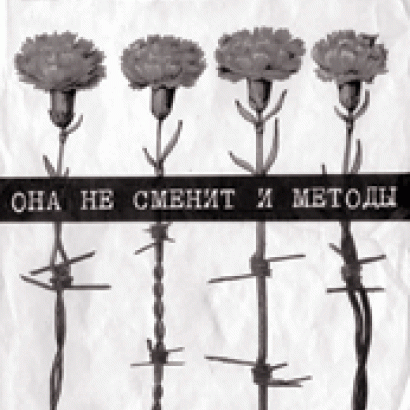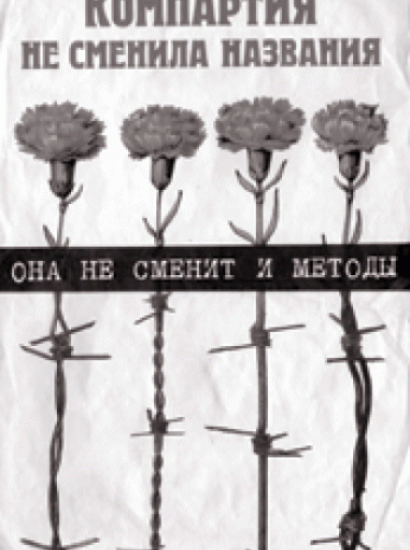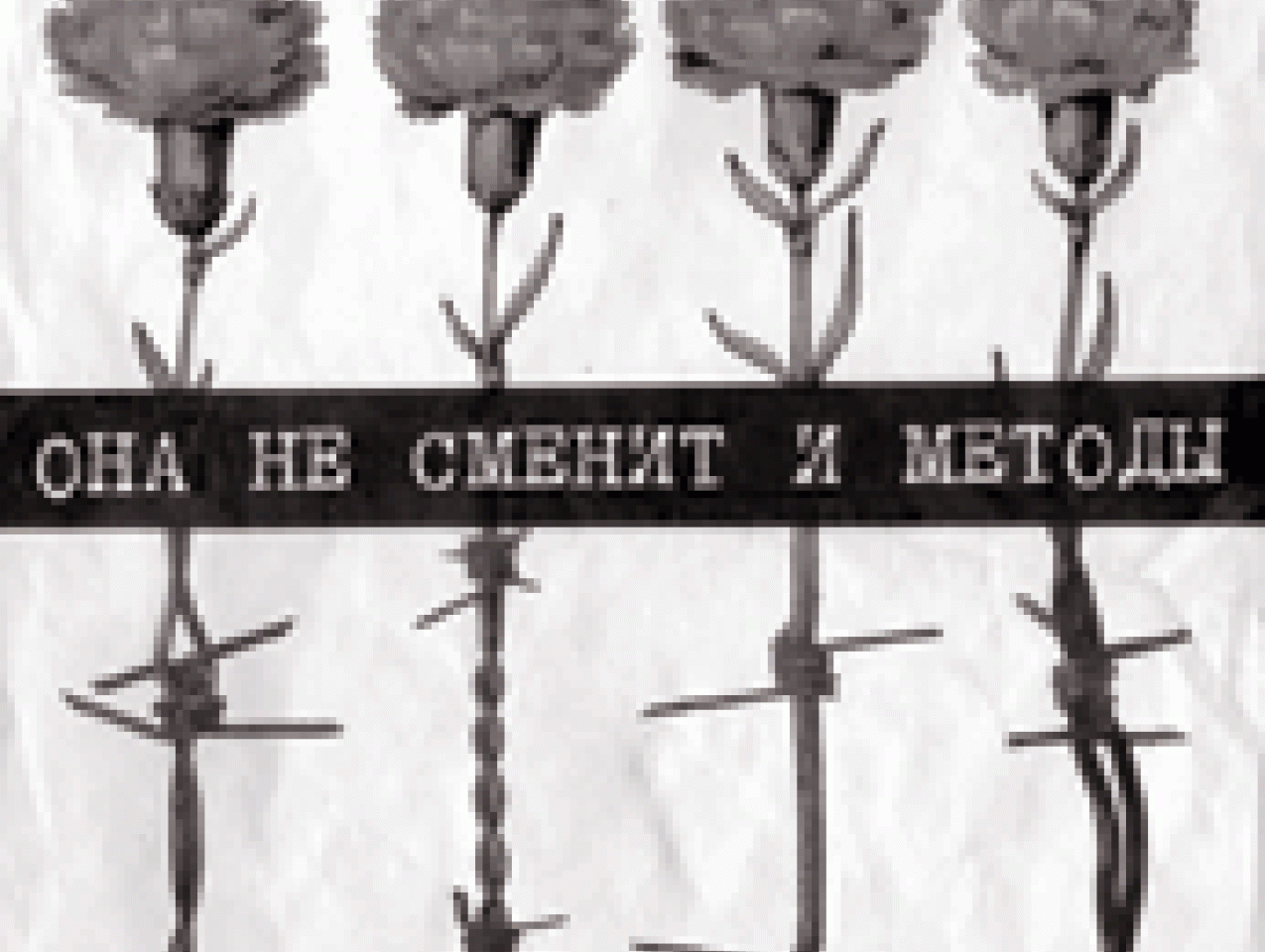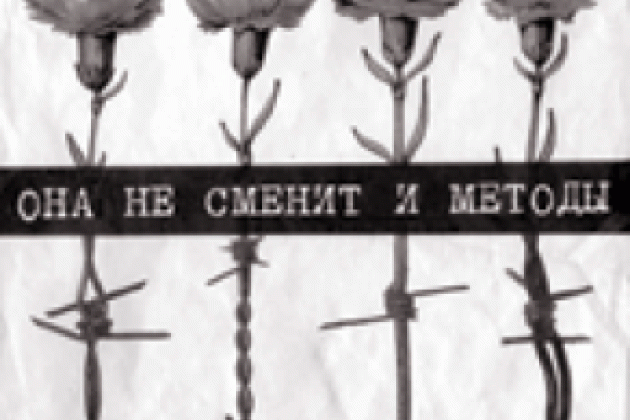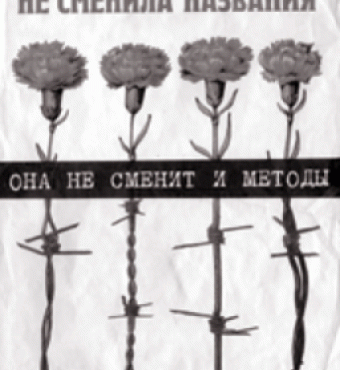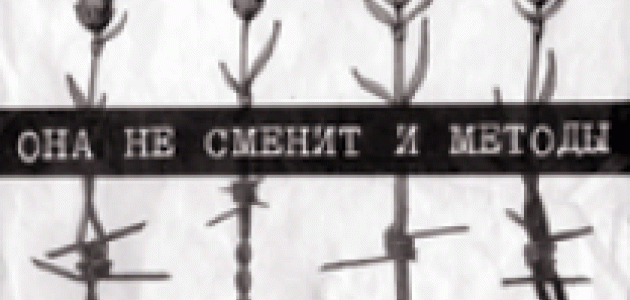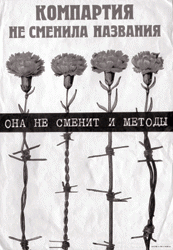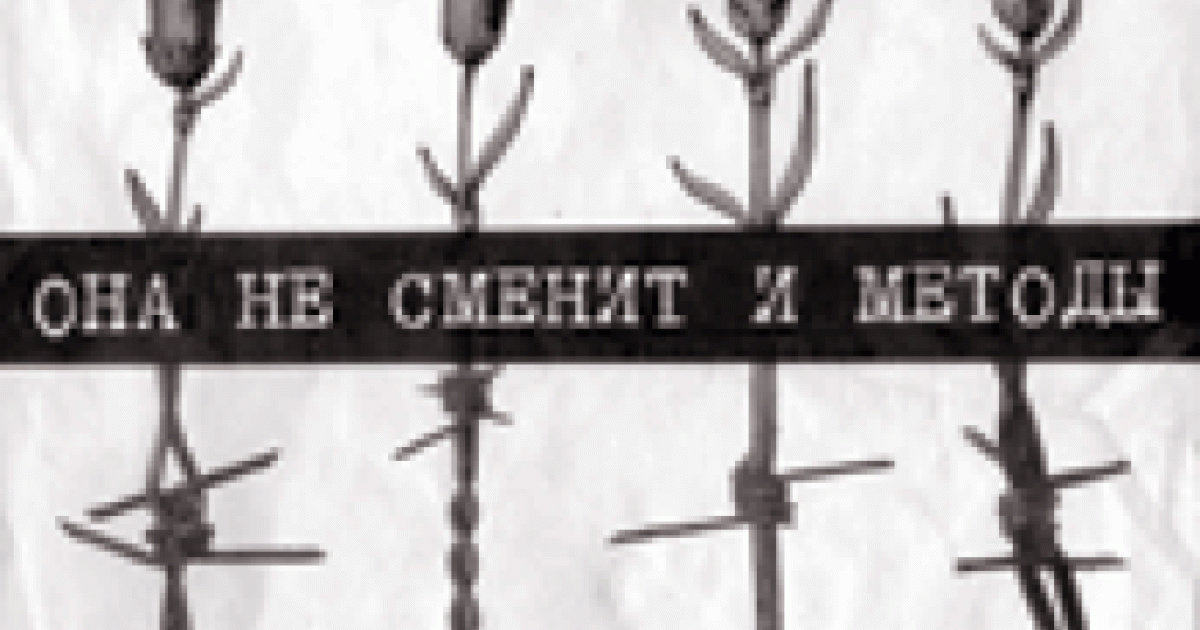- International Affairs
The Good News
The historic events of the 1996 presidential election appear to point to true progress in making a Russian democracy. Especially when compared with other periods of Russia's history--be it the confrontational and ultimately bloody politics of the first years of the new Russian state, the seventy years of totalitarian rule under the Communists, or the hundreds of years of autocratic government under the tsars--the following milestones are truly spectacular.
![]() In December 1995, Russian citizens voted in parliamentary elections. In two rounds of voting in June and July 1996, voters then elected a president. The vote for president was the first time in Russia's thousand-year history that citizens had selected their head of state.
In December 1995, Russian citizens voted in parliamentary elections. In two rounds of voting in June and July 1996, voters then elected a president. The vote for president was the first time in Russia's thousand-year history that citizens had selected their head of state.
![]() Despite calls for delay and postponement, these two elections were held on time and under law. These elections were the first to be held under laws drafted and approved through a democratic procedure by elected officials.
Despite calls for delay and postponement, these two elections were held on time and under law. These elections were the first to be held under laws drafted and approved through a democratic procedure by elected officials.
![]() Both of these elections were relatively free and relatively fair. In the presidential election, Yeltsin grossly violated the campaign finance limits, the media openly propagated Yeltsin's cause, and counting irregularities again appeared in Chechnya and some other national republics; but most agreed that these transgres-sions did not influence the outcome of the vote. Most sig- nificantly, all the major actors accepted the election results.
Both of these elections were relatively free and relatively fair. In the presidential election, Yeltsin grossly violated the campaign finance limits, the media openly propagated Yeltsin's cause, and counting irregularities again appeared in Chechnya and some other national republics; but most agreed that these transgres-sions did not influence the outcome of the vote. Most sig- nificantly, all the major actors accepted the election results.
![]() Large majorities participated in both these elections. In the parliamentary elections, 65 percent of all eligible voters participated, whereas the turnout rates for both rounds of the presidential election approached an amazing 70 percent.
Large majorities participated in both these elections. In the parliamentary elections, 65 percent of all eligible voters participated, whereas the turnout rates for both rounds of the presidential election approached an amazing 70 percent.
![]() When given the choice to vote for nationalists, Communists, or the current reform course, Russian voters overwhelmingly rejected the Soviet past and a fascist future and opted to support Boris Yeltsin. By a margin of ten million votes, Boris Yeltsin defeated his communist challenger, Gennadii Zyuganov, in the second round of the presidential election. This electoral result defied the trend in the postcommunist world in which Communists have tended to win second elections.
When given the choice to vote for nationalists, Communists, or the current reform course, Russian voters overwhelmingly rejected the Soviet past and a fascist future and opted to support Boris Yeltsin. By a margin of ten million votes, Boris Yeltsin defeated his communist challenger, Gennadii Zyuganov, in the second round of the presidential election. This electoral result defied the trend in the postcommunist world in which Communists have tended to win second elections.
![]() After Yeltsin's inauguration, the communist-dominated parliament approved Boris Yeltsin's candidate for prime minister--Victor Chernomyrdin--by an overwhelming majority. This too was a first, as Russia's elected parliament had never approved the executive's choice for prime minister under the procedures outlined in the legitimate constitution. Later in the year, the Duma passed the government's budget without major political conflict.
After Yeltsin's inauguration, the communist-dominated parliament approved Boris Yeltsin's candidate for prime minister--Victor Chernomyrdin--by an overwhelming majority. This too was a first, as Russia's elected parliament had never approved the executive's choice for prime minister under the procedures outlined in the legitimate constitution. Later in the year, the Duma passed the government's budget without major political conflict.
![]() The war in Chechnya has ended, at least temporarily. Although a resolution to the sovereignty issues in question has not been addressed, fighting has stopped. This conclusion of open warfare was the direct result of the presidential electoral process, as both Boris Yeltsin and Alexander Lebed pledged during their campaigns to end the war and then did so after the election.
The war in Chechnya has ended, at least temporarily. Although a resolution to the sovereignty issues in question has not been addressed, fighting has stopped. This conclusion of open warfare was the direct result of the presidential electoral process, as both Boris Yeltsin and Alexander Lebed pledged during their campaigns to end the war and then did so after the election.
![]() Throughout the fall of 1996, dozens of gubernatorial elections were held throughout Russia. Although evidence of falsification has tainted the results in some races, the vast majority were recognized as free and fair by all major participants. Significantly, and against the predictions of most going into the fall electoral season, incumbents supported by Yeltsin's government did not sweep these elections. Rather, the results have been mixed, with independents, Communists, and even a few militant nationalists winning. Aleksandr Rutskoi, the former vice president who led the opposition against Yeltsin in October 1993, was elected governor in Kursk Oblast, and Yevgenii Mikhalov, a leader of Vladimir Zhirinovsky's nationalist Liberal Democratic Party of Russia, won in Pskov Oblast, demonstrating that these elections were not controlled from Moscow.
Throughout the fall of 1996, dozens of gubernatorial elections were held throughout Russia. Although evidence of falsification has tainted the results in some races, the vast majority were recognized as free and fair by all major participants. Significantly, and against the predictions of most going into the fall electoral season, incumbents supported by Yeltsin's government did not sweep these elections. Rather, the results have been mixed, with independents, Communists, and even a few militant nationalists winning. Aleksandr Rutskoi, the former vice president who led the opposition against Yeltsin in October 1993, was elected governor in Kursk Oblast, and Yevgenii Mikhalov, a leader of Vladimir Zhirinovsky's nationalist Liberal Democratic Party of Russia, won in Pskov Oblast, demonstrating that these elections were not controlled from Moscow.
The Bad News
This series of democratic achievements is remarkable. Yet no one in Russia seems impressed. On the contrary, elites, commentators, and the public have grown noticeably more pessimistic about Russia's future since the conclusion of the presidential election in July 1996.
The magnitude of the wage arrears problem, estimated by Labor Minister Melikyan to be forty-two trillion rubles in unpaid wages by the end of 1996, coupled with the government's inability to collect taxes and the lack of economic growth, has fueled speculation of impending social upheaval. Beginning with walkouts by power workers in Primorskii Krai in August 1996, wildcat strikes have increased throughout the country.
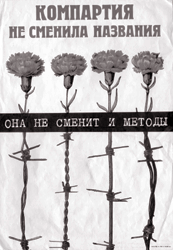 This Russian election poster reads "The Communist Party has not changed its name. It will not change its methods." Courtesy of the Hoover Institution Archives. |
Discontent within the military also appears to be growing, as the armed forces have not been immune from the government's inability to pay wages. In October 1996, General Boris Gromov, the former commander of the Soviet armed forces in Afghanistan, warned that the armed forces were on the brink of collapse. Two weeks later, Defense Minister Igor Rodionov warned that the "extreme" economic and political instability may produce "unpredictable, catastrophic consequences" for the armed forces and the country as a whole. Prime Minister Chernomyrdin was so worried about unrest in the military that he traveled to Ryazan to reassure paratroopers that their wages were coming. Analysts and politicians alike, including General Alexander Lebed, have speculated that the Russian military was close to a massive mutiny.
Others have predicted renewed tensions between the center and the subjects of the federation. The ten richest regions of Russia have expressed their unwillingness to subsidize the other seventy oblasts, krais, and republics through the inefficient, centralized system of transfer currently in place. Instead, the more outspoken leaders of these donor regions, such as Moscow mayor Yurii Luzhkov, have called for a "new deal" between the federation subjects that would exclude the Russian federal government altogether. Because governors are now elected officials, the prospect of renewed tension between the center and the subjects of the federation seems to be growing.
Public opinion polls suggest that the same electorate that supported Yeltsin overwhelmingly in July 1996 does not believe that he or his government can deal with these crises. Yeltsin's approval rating has declined considerably since the 1996 summer ballot. In November, only 10 percent of the Russian population trusted Yeltsin, down from 29 percent in June. More generally, polls conducted by the All-Russian Foundation for Public Opinion at the end of 1996 show that people are much less optimistic about the future than they were just months before.
How can we explain this divergence between achievements in the democratization process of the Russian political system and perceptions of the lack of progress? The answer is located in the nature of the Russian state.
The Russian rulers that occupy the Russian state have neither the will nor the capacity to meet the demands of their citizens writ large because the state does not represent the interest of society as a whole but rather is deeply penetrated by Russia's emergent capitalist class. In a sense, the state has been privatized by this nouveau riche and thereby operates in the interests of its new owners rather than society as a whole. Consequently, the elections and rituals of a democratic polity more generally have only a temporary influence on the policy process.
Once elections are over, the power relations between state and society, which governed state policy beforehand, return to center stage. Given the tremendous role that big business played in financing Yeltsin's reelection effort, its power actually increased after the 1996 vote.
To argue that the state has neither the will nor the capacity to meet the expectations of its citizens does not mean that the situation is unstable or that crisis, breakdown, or revolution is inevitable. A presidential election might bring to power new leaders of mass-based groups not beholden to big business and with the will to use the state to serve the interests of a wide segment of the population. Ultimately, the current equilibrium will change only when the state can be deployed to destroy monopolies, tax profit makers, and provide a more favorable environment for market competition. Although a slow process, this change is most likely to happen through the ballot box. Consequently, understanding electoral dynamics in Russia's next presidential vote, whether it is in 1997 or 2000, is critical to an assessment of Russia's democratic future.
The Election Next Time
Only months after the July 1996 vote, uncertainty surrounding Yeltsin's ability to serve out a second term had launched the next round of presidential positioning, if not outright campaigning. Although the list of candidates poised to complete for the Kremlin remained obvious--Chernomyrdin, Luzhkov, Lebed, Zyuganov, and maybe Boris Nemtsov--the context that will shape a future presidential election has already changed fundamentally.
First, the path to executive power is much better defined today than it was in July. All serious candidates for Yeltsin's job are making strategic calculations about their futures based on the assumption that the next Kremlin ruler will come to power through the ballot box, not through some other method. All major contenders are morally committed to the democratic process, strategically optimistic that the easiest way to obtain power is through an election, or too weak to pursue an alternative method. This shared commitment to the electoral process by all major political forces did not exist before the 1996 presidential vote.
Second, the central organizing concept of the 1996 presidential election--communism versus anticommunism--has already disappeared. The polarized struggle between two fundamentally different systems shaped every national election from 1990 to 1996. In 1996, this debate ended. The atmosphere of intense polarization and heightened confrontation during the 1996 presidential campaign virtually disappeared after the election. Zyuganov and his party accepted defeat, participated in Yeltsin's inauguration, and then overwhelmingly approved Victor Chernomyrdin as Yeltsin's choice for prime minister. Zyuganov then announced the formation of a new political organization, the National Patriotic Union of Russia, which aimed to be more moderate, centrist, and nationalist than the old Communist Party. Above all else, Zyuganov proclaimed that his new political organization should be understood as a supporter of the current "system" and that he had no revolutionary pretensions to undermine the current regime.
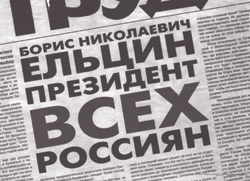 This Russian election poster reads "Boris Nikolaevich Yeltsin: President of All Russians" Courtesy of the Hoover Institution Archives. |
A third difference is that Yeltsin will not be the focal point. With Yeltsin's departure, the field of competition between candidates on the reformist ledger will be more level. The fierce rivalries between political leaders and the economic interest groups behind them are unlikely to arrive at a compromise candidate like Boris Yeltsin. Instead, expect brutal competition between presidential hopefuls. Depending on the timing of the next presidential vote, a similar process may unfold within the opposition, especially now that the charismatic Aleksandr Lebed has fallen from grace within the Yeltsin camp and has the potential to emerge as an opposition leader. The opposition is also more likely to be unified and organized in the next presidential election than are its reformist rivals.
Fourth, Russia does not have interest-based ideological political parties, the kind that shape electoral choices in consolidated democracies. Consequently, Russian citizens will be voting for personalities rather than liberals, conservatives, or social democrats. Big personalities like Lebed and Luzhkov gain from this new context, while gray ones like Chernomyrdin and Zyuganov suffer.
A fifth and final factor has not changed at all: the divide between those benefiting and those suffering from Russia's transition to the market. The thirty million voters who supported Gennadii Zyuganov in July are still solidly opposed to those in power. Although they may not support Zyuganov again, they are unlikely to vote for anyone identified with the status quo such as Chernomyrdin or Yeltsin's chief of staff, Anatolii Chubais. Moreover, we know from previous elections and polling data that these people are most likely to vote, are not easily swayed by national television propaganda, and are worse off today than they were six months ago. Over time, this opposition vote will dissipate, as they are Russia's oldest generation of voters. But in the event of an early election, expect a substantial part of Russia's electorate to go to an opposition candidate. Today, Lebed is the obvious heir apparent to that large protest vote.
At the same time, the preferences of the forty million that supported Yeltsin in the second round are not as obvious. For many of these voters, fear of communism, not support for the ruling "party of power," motivated their choices in July. With the fear factor fading, these voters will likely split their support among competitors from within the party of power or not vote at all. (Do not expect a 70 percent turnout again.) Polls soon after the election showed a sharp decline in popular support for Yeltsin, falling to single digits by December 1996. Moreover, in the new "ideology-free" context, Lebed can compete for these former Yeltsin supporters just as well as Chernomyrdin or Luzhkov. Remember, roughly seven million of Yeltsin's supporters in the second round voted for Lebed in the first.
This new electoral landscape, coupled with the blurring of ideological divisions, gives opposition candidates such as Lebed an immediate advantage and provides less electorally attractive opposition candidates such as Gennadii Zyuganov negotiating leverage with all contenders. If united (a major assumption), the party of power will enjoy unlimited financial support and monopolistic control over national television but will still find it difficult to convince a majority of Russians to vote it into power again.
The Hope for Renewal
Its victory, however, is no longer necessary for Russian democracy. With the battle between communism and capitalism over, the greatest threat to either market or democratic development in Russia is no longer Zyuganov or even Lebed but political instability, democratic collapse, or authoritarian rule.
That no one seems ready to challenge the existing rules of the game means that the stakes in Russia's next presidential election, no matter who wins, will be much lower than those of the previous election. By helping establish elections as the only game in town, this precedent setting election of 1996 may provide the means for democratic renewal in Russia in the future.








